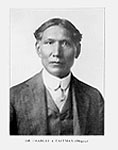Chapter 15. "The Soul of the Indian" by Ohiyesa

Dr. Charles A. Eastman (Ohiyesa), Library of Congress
About the author…
Ohiyesa's mother died soon after birth and his father, Many Lightnings, was captured after the 1862 Dakota uprising and presumed hanged with over 300 other Sioux. Ohiyesa (1858-1939) was traditionally reared in Sioux language and culture by his grandmother for the first fifteen years of his life. When his father, who had in fact been pardoned by President Lincoln and had spent 12 years in an Iowa prison, suddenly appeared, Ohiyesa was required to move to a Christian Dakota community. Ohiyesa took the name of Charles Alexander Eastman, won scholarships, graduated from Dartmouth College in 1887, and studied medicine at Boston University. Under horrific conditions, he was the sole physician at the Wounded Knee massacre. Encouraged by Zitkala Sha (Red Bird), who studied music at the Boston Conservatory of Music (see image below), he began to write of his culture and experience.
About the work…
In his Soul of an Indian,[1] Ohiyesa portrays the nomadic life and culture of the American Indian prior to interaction with the white man. This selection from Chapter 10 of that book, "Barbarism and the Moral Code," defends Indian ethical practices from the stereotypic view of many non-native Americans.
Ideas of Interest from The Soul of an Indian
Why is silence such an essential part of character for the Sioux?
What sociological reasons can be provided for the relatively conservative sexual ethics of the Sioux?
What are the exceptions, pointed out by Ohiyesa, to the dishonor of stealing—why are these exceptions allowed?
What is the rationalization Ohiyesa relates for the killing of noncombatants (women and children) in war?
Why was prosecution and proof unnecessary among the Sioux for "conviction" in cases of murder?
Ohiyesa asserts that the coming of the white man was the cause of much barbarism in Indian affairs. What are the reasons he offers for these changes in Indian culture? Is his reasoning convincing or is he merely asserting a series of historical facts?
Why, according to Ohiyesa, was lying, at one time, a capital offense?